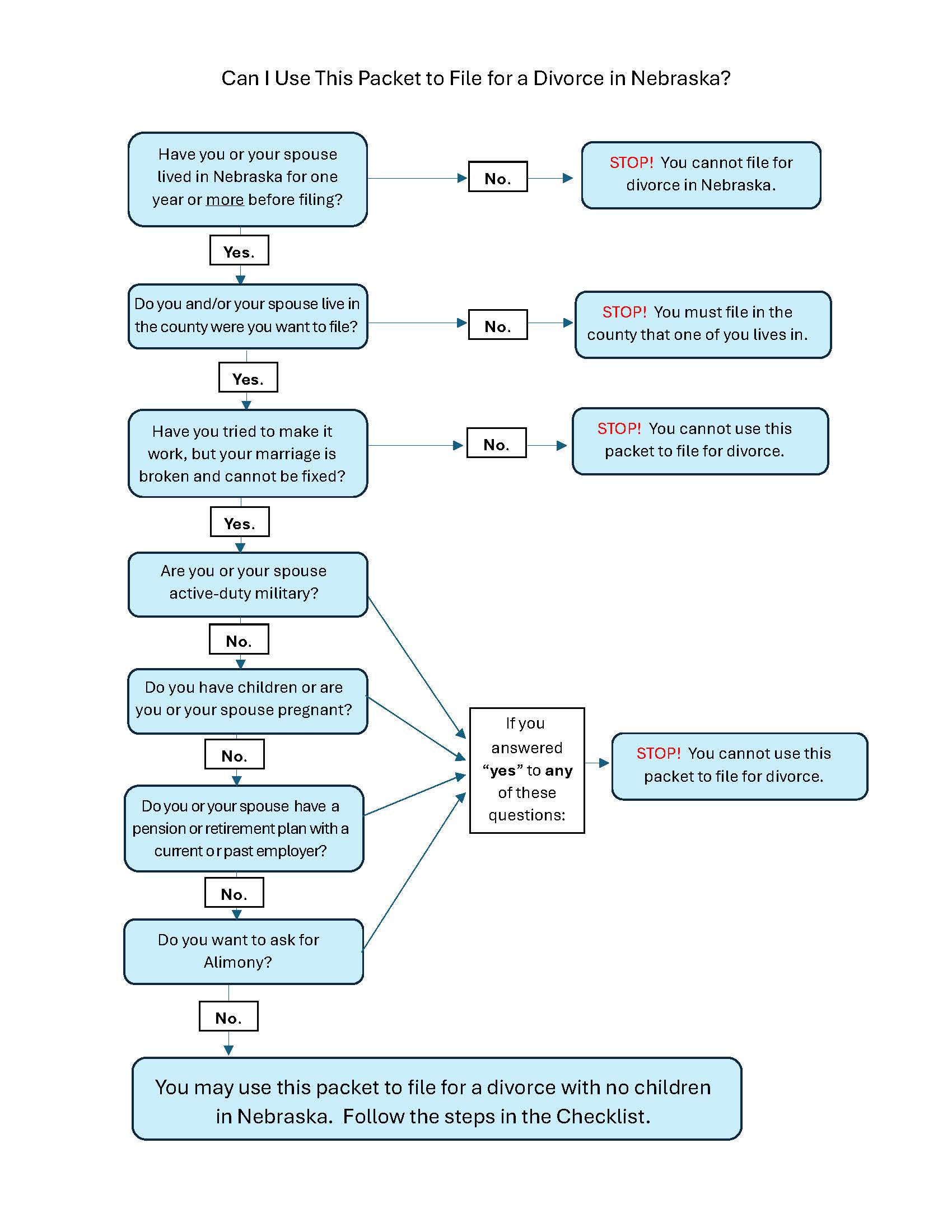Divorce - No Children
Generally, under Nebraska law, people can file for a divorce without the help of an attorney.
There are many items to consider when deciding if filing without the help of a lawyer is in your best interest. The process involves filling out court forms, appearing before a judge, and if either party has property or any retirement accounts, it may get very complicated.
If you do not understand how to fill out the forms and follow the court procedures, you should talk to a lawyer. There may also be Self Help Centers in the courts where you could get help with the forms and court procedures.
Helpful information
How long will a divorce take?
Divorces generally take at least three months to finalize. This is because there is a sixty-day waiting period between filing and the final decree, plus scheduling generally takes at least a few weeks. Based on various factors, divorces may take much longer.
WAITING PERIOD
- Nebraska has a 60-day waiting period for divorces, starting from when your spouse is served notice of the divorce.
- The official notice date will be:
- If you use VOLUNTARY APPEARANCE:
- The date you file the signed Voluntary Appearance with the court
- If you use SERVICE OF PROCESS
- Or the date the Sheriff serves the Complaint and Summons to your spouse.
- If you use CONSTRUCTIVE SERVICE
- The date of the last action taken, either posting or mailing
- If you use NOTICE BY PUBLICATION
- The date of the last publication of the notice in the legal newspaper.
- If you use VOLUNTARY APPEARANCE:
Remember: You must wait for at least 6 months after the Divorce Decree (Order) is singed to get remarried.
 About Your Divorce
About Your Divorce
You can file for a divorce without an attorney. If you do not have an attorney, you must file all the needed forms/legal paperwork yourself. Divorce cases are filed in the district court in the county that either you or your spouse currently lives.
 You must make sure you can legally file for divorce in Nebraska.
You must make sure you can legally file for divorce in Nebraska.
To do this, answer these questions:
- Have you or your spouse lived in Nebraska for one year before filing? _____ Yes _____ No
- Do you and/or your spouse live in the county in which you are filing? _____ Yes _____ No
- Have you tried to make it work, but your marriage is broken and unfixable. _____ Yes _____ No
If you answered “No” to any of these questions, you cannot file for a divorce using this packet.
ALSO:
- This Divorce packet is NOT to be used if:
- You or your spouse are active-duty military,
- You have children or you or your spouse is pregnant,
- You would like to request alimony, or
- If you or your spouse has a pension or retirement plan with a present employer or past employer.
This flowchart may help to see if you are able to file for a divorce on your own.

 The information you need to know to complete the forms:
The information you need to know to complete the forms:
Information for the Complaint for Dissolution:
- Information about you:
- Your full name
- Your complete address
- Your phone number
- Your email address
- The place and date you were born
- If you want your previous or maiden name returned, what that is.
- Information about your spouse:
- Their full name
- Their complete address
- Their phone number
- Information about the marriage:
- The date of the marriage
- The place the marriage took place
- IF there are any current restraining orders, protection orders, or criminal no-contact orders regarding one or more of the parties:
- The type of order
- Name of the court
- Case Number
- Date of the order.
Additional Information for the Vital Statistics Form
- The place and date you were born
- The place and date your spouse was born
Additional Information for the Confidential Employment and Health Information form not included in the public records:
- Your Employer
- Your Health Insurance Information
- Your Spouses Employer
- Your Spouses Health Insurance Information
Additional Information for the Confidential Social Security, Gender, Date of Birth form not included in the public records:
- Your Social Security Number
- Your birthday
- Your Gender
- Your Spouses Social Security Number
- Your Spouses birthday
- Your Spouses Gender
COSTS YOU WILL PAY FOR:
 The filing fee.
The filing fee.
Found at this link: nejudicial.com/filing-fee-divorce

- If you cannot pay the filing fee, ask for forms and information for a fee waiver. Sometimes, this is referred to as "In forma pauperis" or "IFP". If you are granted a fee waiver, it is a way to file your request without paying fees to the court. The forms are found at nejudicial.com/paymentwaiver.
 Giving your spouse a copy of the papers, or having them served.
Giving your spouse a copy of the papers, or having them served.
- Depending on your situation, there are different types of service.
- Voluntary Appearance: this is the easiest way to serve your spouse and is an option if your spouse is willing.
- Service of Process – done by the Sheriff’s Office. Check with your local Sheriff’s Office for the cost.
If you are unable to have your spouse served after at least 2 attempts or if you do not know where to find them, other options are available. See the Service Guide for Divorce for more options. These all have a cost associated with them.
- Be aware that these other methods do not allow the judge to award alimony, but they will still be able to approve your divorce and award property.
CHECKLIST: For a printed copy of the checklist use this link
 Required Forms
Required Forms
- Complaint for Dissolution of Marriage without children (DC 6:4.1)– Step 3
- Vital Statistics Certificate (Bureau of Vital Statistics Worksheet)– Step 3
- Confidential Employment and Health Insurance Information (DC 6:5.11) – Step 3
- Social Security, Gender, Birth Date(s) (DC 6:5.12) – Step 3
- Forms for Service – Step 4
Voluntary Appearance (DC 6:4.3)
or
- Praecipe (Request) for Summons (DC 6:4.4)
- Notice of Hearing and Certificate of Service (DC 6:4.5) Step 7
- Instructions for Divorce Hearing (DC 6:4) -Step 8
- Decree of Dissolution of Marriage – No Children (DC 6:4.6) – Step 9
All forms in this list can be found HERE : nejudicial.com/divorce-no-children-forms or through this QR Code

 Step 1 - Can you get divorced Nebraska?
Step 1 - Can you get divorced Nebraska?
- Have you or your spouse lived in Nebraska for one year or more before filing?
- Do you and/or your spouse live in the county in which you are filing?
- Have you tried to make it work, but your marriage is broken and unfixable.
If you answered “NO” to any of these questions, you cannot file for a divorce in Nebraska.
- IMPORTANT: This Divorce packet is NOT to be used if:
- You or your spouse are active-duty military,
- You would like to request alimony, or
- If you or your spouse has a pension or retirement plan with a present employer or past employer.
 Step 2 - Expected Costs for a Divorce without Children
Step 2 - Expected Costs for a Divorce without Children
- You are expected to pay Nebraska Filing Fees and Court Costs and the cost to have the other party served with a copy of the papers.
- It costs approximately $200 to get divorced Nebraska.
- If you cannot pay the fees and you would like the judge to grant a request to proceed without payment of fees see Appendix A - Fee Waiver Guide
- Costs may change
- Use the QR code or this link: nejudicial.com/filing-fee-divorce to find the Filing Fees and Court Costs

 Step 3 – Filing – See the Petition Guide for additional information
Step 3 – Filing – See the Petition Guide for additional information
- You need to give the district court the paperwork explaining that you want a divorce and who you are. The Nebraska Supreme Court provides the forms and instructions. You need to read the forms and instructions completely.
- Initial forms:
- Complaint for Dissolution of Marriage without children (DC 6:4.1) &
Instructions (DC 6:4.1a) - Vital Statistics Certificate (Bureau of Vital Statistics Worksheet)
- Confidential Employment and Health Insurance Information (DC 6:5.11) &
Instructions (DC 6:5.11a) - Social Security, Gender, Birth Date(s) (DC 6:5.12) & Instructions (DC 6:5.12a)
- Complaint for Dissolution of Marriage without children (DC 6:4.1) &
- Completed forms may be filed in person, or mailed to the District Court in the county in which you are filing. Addresses and contact information can be found at this link: nejudicial.com/dc-clerk-contact , or through the QR code.

- You should also bring or mail a money order or check for $163.Ask the district court clerk who the check should be made payable to. Do not send cash in the mail.
 Step 4 – Service – See the Service Guide for additional information
Step 4 – Service – See the Service Guide for additional information
The law requires you to tell your spouse you have filed for divorce. This is called
Service. Depending on your situation, there are different types of service.
- See the guide for service. Each type of service requires paperwork which must be completed and given to the court clerk’s office. This is called Proof of Service or Return of Service.
 Step 5 – Property and Liability Division Guide – See the Property Division Guide for more information
Step 5 – Property and Liability Division Guide – See the Property Division Guide for more information
- Check with your local district court to see if they have a property statement they use.
 Step 6 – Waiting Period for Final Hearing
Step 6 – Waiting Period for Final Hearing
- After the divorce is filed and after your spouse is served with notice of your Complaint, your spouse has 30 days to file an Answer and respond to your Complaint. There is a waiting period of at least 60 days after your spouse was legally notified (served) that you filed for divorce before a final hearing may take place.
- When this waiting period starts depends on the method of service used.
 Step 7 - Scheduling your Hearing – Check with the clerk in the county where you filed for their local rules about scheduling a hearing.
Step 7 - Scheduling your Hearing – Check with the clerk in the county where you filed for their local rules about scheduling a hearing.
DO YOU NEED TO SEE A JUDGE? IF SO, WHEN?
- If your spouse did not respond or if you and your spouse have resolved all issues but you still want a hearing. See Instructions on Scheduling a Final Hearing.
- If you and your spouse do not agree on a final decree, then you will likely need to go to trial. Trials have many technical rules. You cannot just “tell the judge your side of the story”. If your plan is to go to trial, this packet is not sufficient to help you and you should consult with an attorney, mediation services, or other supports.
OR
- If you and your spouse agree on everything, some district courts may allow you to request the final hearing be waived. This means you wouldn't need to see a judge. Check with the clerk of the district court in the county where you are filing to find out if they allow this option. See "When to Submit a Decree for Dissolution of Marriage without a final hearing" in the Decree Guide. Read all of the requirements carefully.
 Step 8 - Get Ready for Your Hearing –
Step 8 - Get Ready for Your Hearing –
- Complete the Instructions for Divorce Hearing form (your script for the hearing.)
- Practice reading from the Hearing Instructions form.
- Complete the Decree of Dissolution of Marriage – No Children. Use the instructions.
- Plan your Transportation and Parking to the courthouse.
- Make sure you know the courtroom number for your hearing, if there is one.
 Step 9 – Your Divorce Hearing
Step 9 – Your Divorce Hearing
- Bring 2 completed copies of the Decree of Dissolution of Marriage – No Children.
- Bring your completed copy of the Hearing Instructions form.
- Know your courtroom number, if there is one.
- Arrive at the courthouse 30 minutes before your hearing.
- Be at the assigned courtroom at least 15 minutes before your hearing.
- Be prepared to confirm you have tried to fix your marriage, but it is irretrievably broken.
 Step 10 - After the hearing – After the divorce decree
Step 10 - After the hearing – After the divorce decree
- Make sure you have a certified copy of the final decree made by the District Court Clerk's Office to keep in your records.
- The Decree is a court order. You and your ex-spouse must follow what is in the decree. If you or your ex-spouse do not follow the decree, you may be held in contempt of court.
- If you do not agree with the decree, you should explore legal resources as soon as possible to learn about possible next steps.
- Once the decree is signed by the judge and placed on the record with the clerk of the court, you are divorced for all legal purposes, such as taxes.
- Thirty days after the decree, the decree can no longer be appealed.
- You must wait six months to remarry.
PETITION GUIDE: To print a copy of this guide, use this link.
Petition Guide
To Drafting A Complaint
- Every case needs a complaint. It tells the court:
- Who you and your spouse are
- What the conditions of the divorce should look like
- Other technical legal matters that the judge needs to know
- If you do not agree with what the Nebraska Supreme Court Form complaint says, you need to draft your own Complaint following court rules
- Court rules are very precise, and it is strongly advised that you work with an attorney to do this
- Many attorneys offer limited scope services just for document drafting that are more affordable than full representation
- There are also free legal services that may be accessible
- Forms You Will Need When You File The Complaint
- Complaint for Dissolution of Marriage without children (DC 6:4.1) & Instructions (DC 6:4.1a)
- Vital Statistics Certificate (Bureau of Vital Statistics Worksheet)
- Confidential Employment and Health Insurance Information (DC 6:5.11) & Instructions (DC 6:5.11a)
- Social Security, Gender, Birth Date(s) (DC 6:5.12) & Instructions (DC 6:5.12a)
SERVICE GUIDE: To print a copy of this guide, use this link.
HEARING GUIDE: To print a copy of this guide, use this link.
PROPERTY DIVISION GUIDE: To print a copy of this guide, use this link.
DECREE GUIDE: To print a copy of this guide, use this link.
DECREE GUIDE
- The decree is the document the court will sign stating that you and your spouse are
divorced. - The decree sets out the legal terms of the divorce.
- If you and your spouse can agree on the decree,
• you can have a final hearing or
• or submit paperwork to waive the final hearing - If you cannot agree on the decree:
• You will need to have a trial.
• If you have a trial, the information you need is beyond the scope of this
packet. - Form
o If your spouse signed a voluntary appearance or the sheriff served them, you can
use this form:
• Decree of Dissolution of Marriage – No Children (DC 6:4.6) &
Instructions (DC 6:4.6a)
o If you used service by publication, you can use this form:
• Decree - No Children - Service by Publication (DC 6:6.6) &
Instructions (DC 6:6.6a)
o You and your spouse may or may not need a final hearing, see following pages
for guidance on next steps.
When to submit a decree for Dissolution of Marriage without a final hearing
- You may submit a Decree for Dissolution of Marriage without a final hearing if:
- Your spouse was properly served with a notice of your Complaint;
- Your spouse filed an Answer to your complaint within thirty (30) days;
- More than sixty (60) days have passed since your spouse was properly served with a notice of your Complaint.
- Both you and your spouse agree to all terms of the final Divorce Decree.
- Your spouse was properly served with a notice of your Complaint;
How to Submit a Decree for Dissolution of Marriage without a final hearing:
- Complete Plaintiff's Request for Decree of Dissolution of Marriage Without Hearing (DC 6:4.9)
- You must sign this document in the presence of a notary public.
- Your spouse must complete Defendant’s Request for Decree of Dissolution of MarriageWithout Hearing (DC 6:4.10)
- Your spouse must sign this document in the presence of a notary public.
- You must bring or mail the following documents to the District Clerk’s Office:
- You may (if you or your spouse feel it is necessary) bring
- A notarized Joint Property & Liability Statement
APPENDIX A: To print a copy of this appendix, use this link
Appendix A
Fee Waiver Guide
Request to Not Pay Court Fees
Things to Know:
- If you do not have enough money to pay for court fees, you may qualify for a fee waiver. Sometimes, this is referred to as "In forma pauperis" or "IFP".
- Other costs may be covered by the county if the court grants your fee waiver request, including:
- Service fees,
- Witness fees, and
- Fees associated in cases of appealing a judgment (a final order of the court)
- Mediation
- Your request will not be granted if:
- The judge determines you have enough money to pay the costs and fees for your case, or
- The judge determines your legal claim is “frivolous or malicious.”
D If your request is denied because it is “frivolous or malicious,” the court will tell you why.
- If you win and are granted a money judgment in your case, such as in a lawsuit or small claims, any costs that the county paid will be taken from the judgment.
Required Forms for Civil Cases, Appeals, and Emancipation
- Affidavit and Application to Proceed without Payment of Fees (In Forma Pauperis); DC 6:7.1. Use the instructions.
- Include all information asked for in the Affidavit and Application form
- Be honest when completing the Affidavit and Application
- Order to Proceed In Forma Pauperis; DC 6:7.2. Use the instructions.
Turning in Your Request
- If you are turning in the Affidavit and Application and the Order at the same time you turn in the forms for your case, your case will not be “filed,”
- Unless you pay the filing fees,
- Until after the court grants your request, or
- Until you pay the fees after the court rejects your request.
- If your request is rejected, you will be notified by the court, and you pay the filing fees. Only after you pay will your forms be considered “filed.”
- If your request is granted, the clerk of the trial court, either county or district, will include the order with your other forms and “file” your case.
- You will not get a case number (sometimes called a Case ID) until your case is “filed.”
Nebraska Laws and Nebraska Supreme Court Rules that apply:
Click on the District below for detailed resources.
District 4 Resources:
Douglas County
Adult Name Change Packet (customizable)
To All Persons Representing themselves:
- You are responsible for all steps.
- You are responsible for all information provided.
- Court staff cannot give legal advice. If legal advice is needed: click Legal Self-Help Center.
- Court staff cannot complete the forms for me or on my behalf.
- Court staff cannot correct any of the information I include on the forms.
- Write clearly. Check spelling. Forms that cannot be read or are incomplete may result in the court denying your name change or additional court hearings and possibly added expense.
- Courts may have additional local rules. The court staff will guide you through those extra steps. You will be required to complete them.
